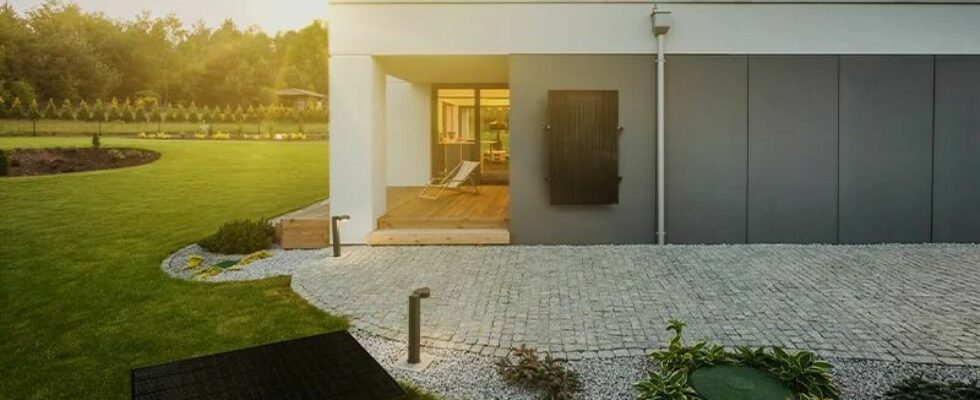Anyone who puts a balcony power plant into operation in winter may quickly lose faith in their own energy production. By choosing the right components you can avoid frustration.
Balcony power plant (source: priwatt)
If you want to start your own energy production with a balcony power plant in winter, you can avoid major frustration in advance. The balcony power plant should have some important specifications in order to optimize the energy yield even on the shortest days.
Of course, the first and foremost motto is that a balcony power plant cannot be “big” enough. This means that, within the scope of local possibilities, as many solar modules should be installed as can be reasonably installed. Each individual standard module now generally delivers more than 400 watt peak; with a limit of 800/600 watt feed-in power, at first glance it hardly makes sense to install more than two modules with a total of over 800 watt peak power.
However, this only applies to the peak performance, which can be achieved in the summer months for a few hours a day in the best weather. In winter, every additional panel helps to achieve a significant energy yield.
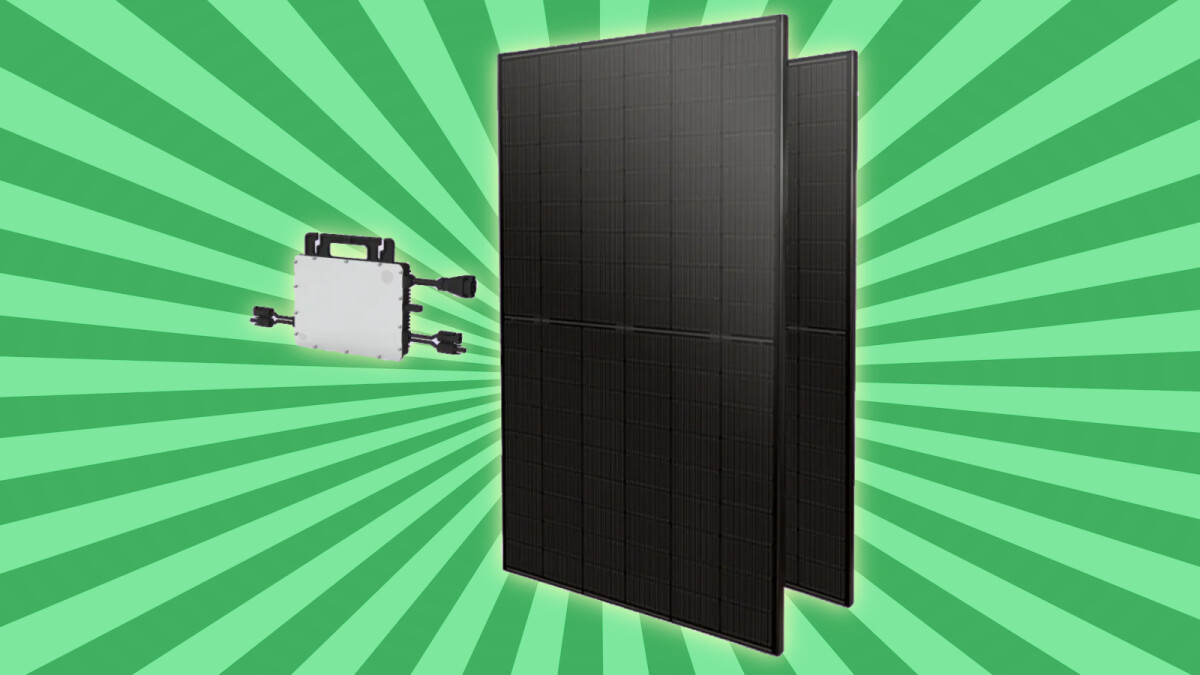
Bifacial duo balcony power plant and updateable at priwatt. (Source: priwatt)
The modules usually make sense when they are oriented as south as possible. In addition, ideally there should be no shading of the modules from neighboring houses, roof overhangs, awnings or trees – shading significantly reduces yield.
Bifacial solar modules increase the yield in diffuse light
Low light behavior and temperature coefficient
Update capability from 600 to 800 watts
Optional Specs
Buy balcony power plants for the winter
The alternative to the premium balcony power plant: the bargain
In most cases there should be space for at least one and a maximum of four solar modules; the duo balcony power plant with two solar modules and an inverter is considered a standard balcony power plant. A system that is as south-facing as possible and has an angle of attack to the sun of around 30 degrees is also considered the optimal case; deviations from this lead to a loss of yield.
However, it is not always possible to have an exact south orientation, and the degree of personal use is also a decisive factor when calculating the return on investment for a solar system.
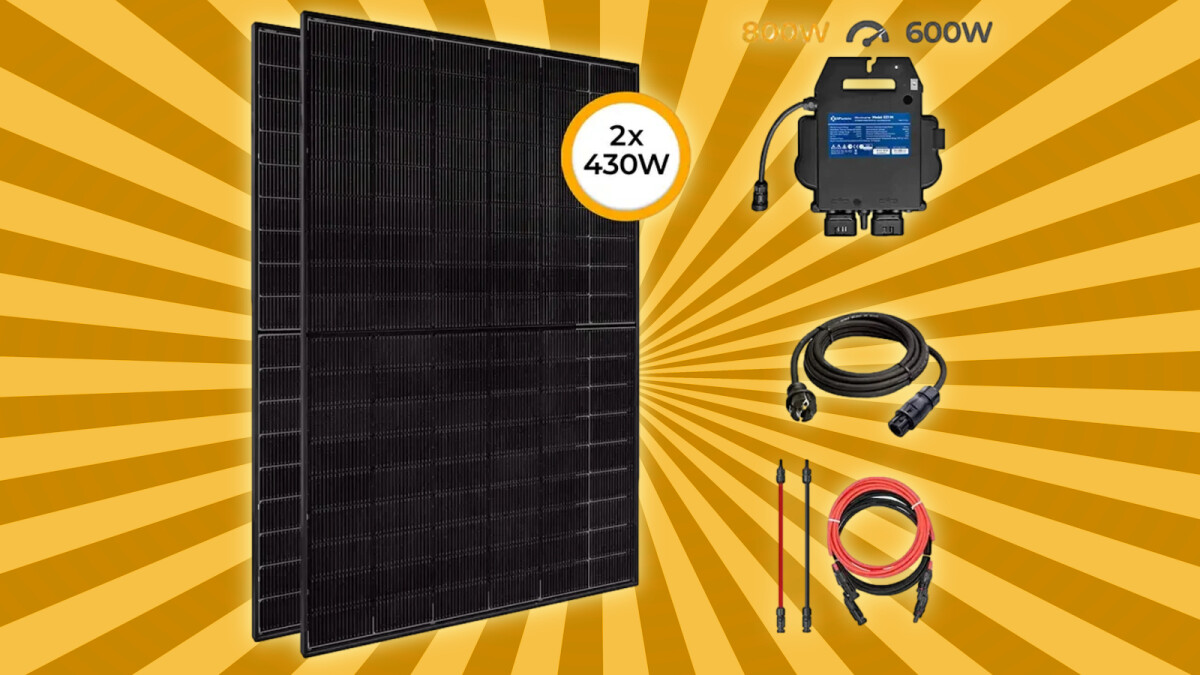
Bifacial duo balcony power plant and updateable at Solago (Source: Solago)
It also depends on your individual consumption profile as to which orientation leads to optimal results – because with an east and west orientation you will be able to harvest energy more widely throughout the day, which with a south orientation is available more intensively in the midday hours and in has reached a minimum in the evening and morning hours.
NETZWELT may receive a commission from the retailer for links on this page. More info.
The frequent precipitation in the winter in the form of rain and snow does not pose a problem for balcony power plants. At least the modules, when installed correctly, are weatherproof with different IP certifications and are snow-proof – when it snows, balcony power plants have the great advantage that they usually remain accessible and can be reached Snow can be removed manually from the modules.
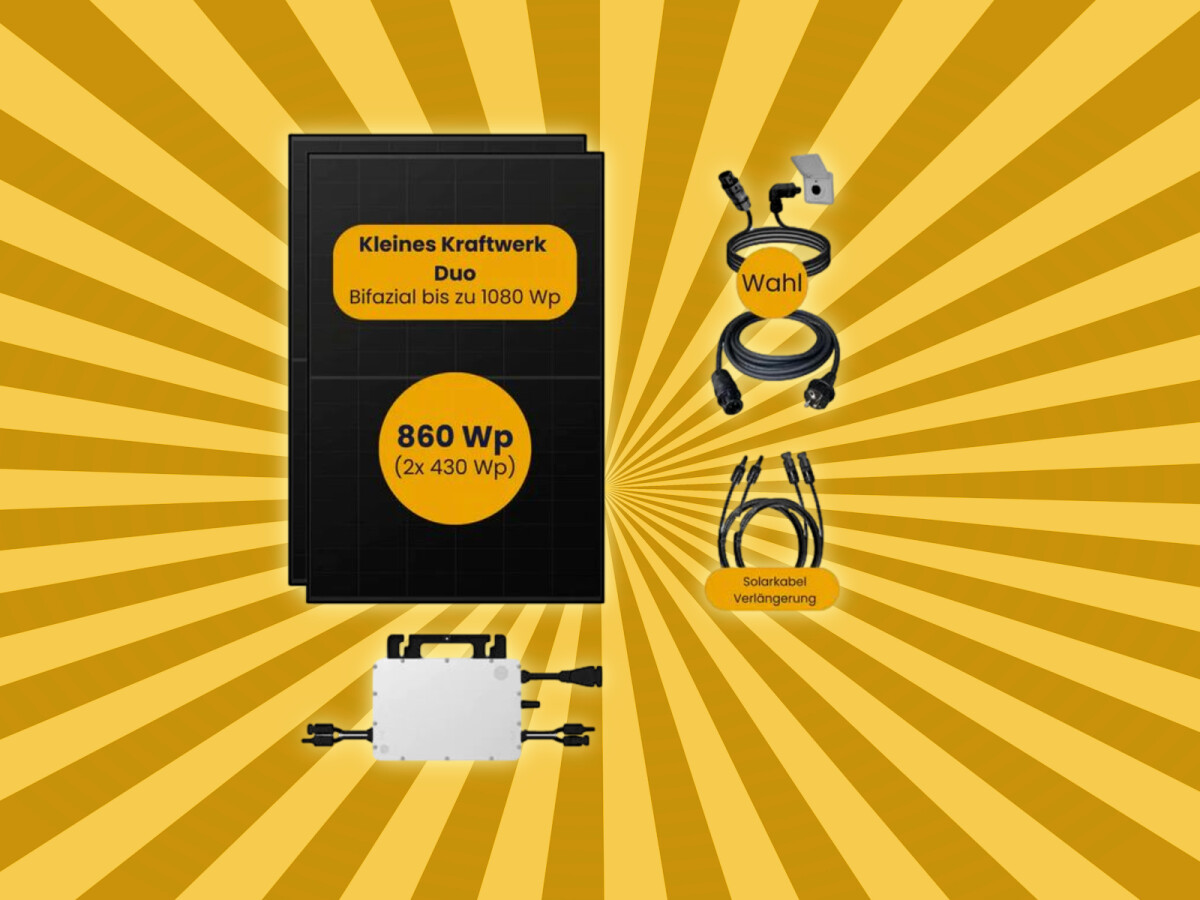
Bifacial duo balcony power plant and updateable at a small power plant (Source: Kleines Kraftwerk)
If snow remains on a roof PV system due to the temperature, or if new snow keeps falling, the sun can shine for hours in between and the system remains completely switched off – until the modules are free again.
Bifacial solar modules increase the yield in diffuse light
But in order to suffer losses, solar energy must first be produced. And this is difficult in the dark season because not only does the sun not shine for most of the day. The likelihood of cloud cover or fog is also significantly higher than in the summer months, and in combination these two effects lead to frustrating days for solar producers: on quite a few days the harvest is close to or nil.
- Duo balcony power plant at priwatt – bifacial €0.00 €537.00
- Duo balcony power plant at Solago €0.00 €498.00
- Duo balcony power plant at Kleines Kraftwerk €0.00 €466.65
- Duo Balcony Power Plant near Yuma €0.00 €638.00
- Duo balcony power plant 800 W / WR 600-800W can be updated €0.00 €289.00
NETZWELT may receive a commission from the retailer for links on this page. More info.
With the optimally aligned roof PV system located here on the roof and a peak output of 13.5 kWp, a total of only 235 kWh of electricity was produced on the 30 days of November.
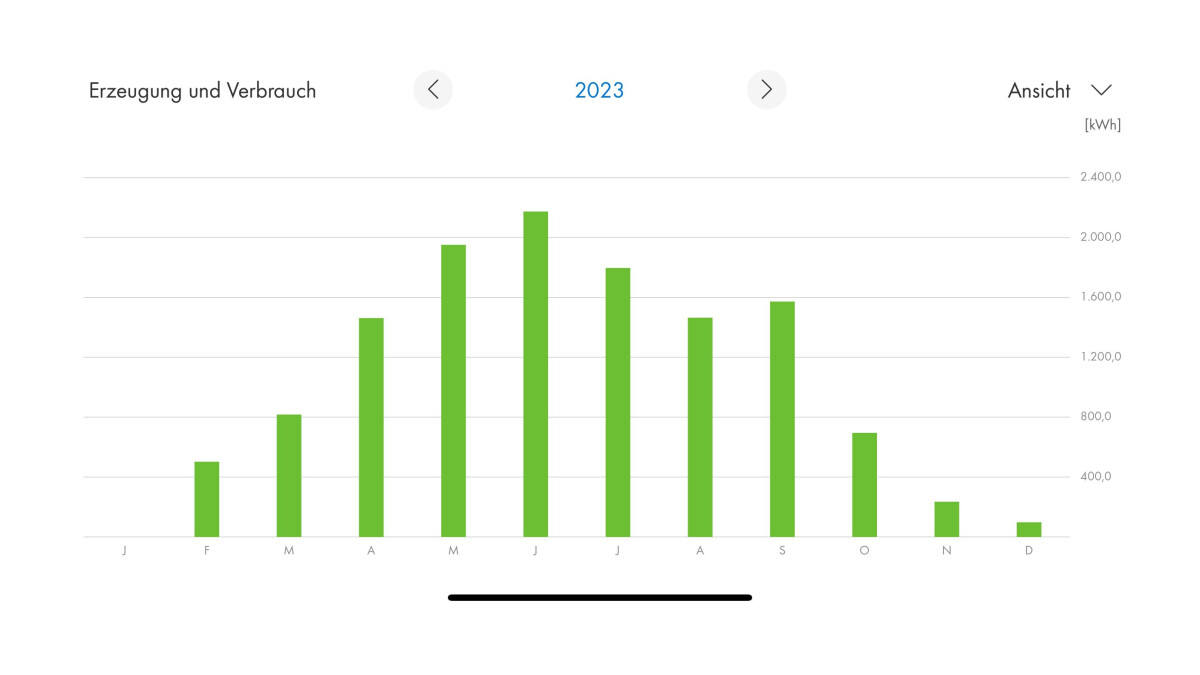
Typical energy production of a solar system over the course of the year (13.5 kWp South)
Broken down to a balcony power plant with a maximum feed-in power of 600 watts, that’s around 10 kWh, the equivalent of four euros, if the energy is used entirely by yourself. The winter solstice on December 22nd, the day with the least sunlight, is yet to come.
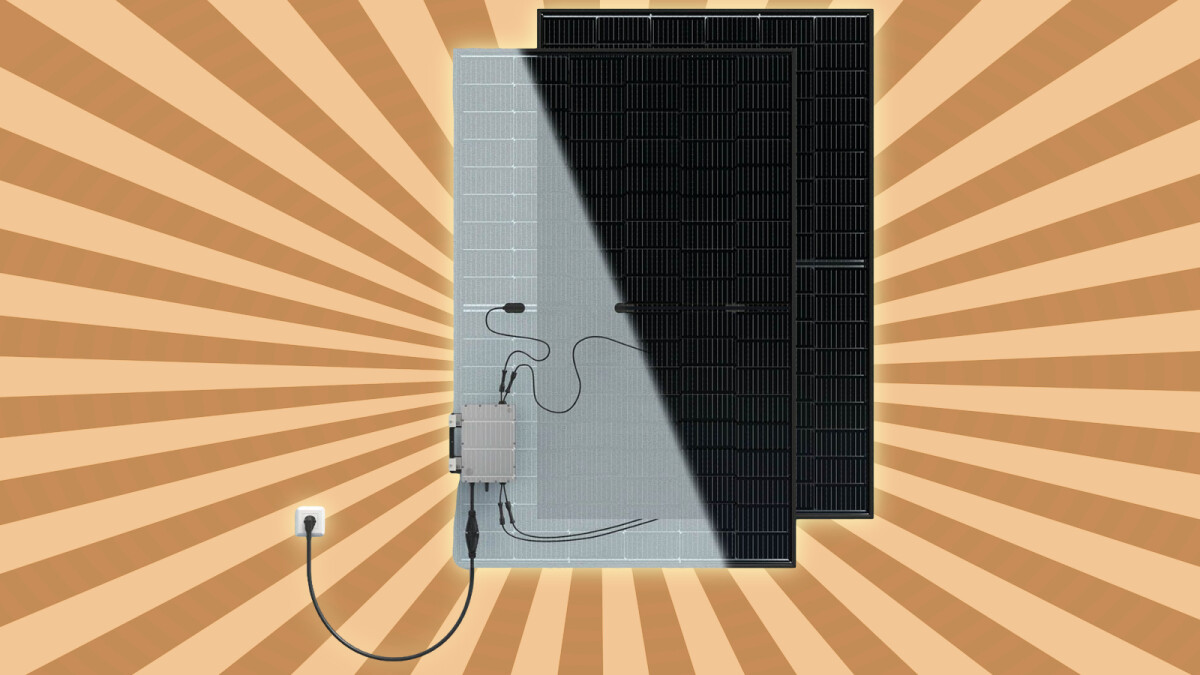
Duo balcony power plant bifacial and updateable at Yuma (Source: Yuma)
In December it is only light for around eight hours and dark for 16 hours of the day, and it is mostly cloudy – the daylight is therefore predominantly diffuse. A bifacial solar modulewhich can produce solar energy not only from the front but also from the back, has an advantage here.
Of course, this only works if light can reach the underside of the panel and the background is as bright as possible, because bright surfaces reflect a large part of the incident light.
There are therefore usually two values specified for the maximum production output of a bifacial solar module: the maximum yield with the top and a smaller value for the maximum harvest with the bottom (or in addition to the value for the top, a second higher value including the output of the Bottom).
Low light behavior and temperature coefficient
A particularly important factor in winter is the low light behavior of a solar module. We always speak of weak light when the solar energy hitting the earth falls below 1,000 watts per square meter. This is often the case all day in winter, when there is either no sun shining or the sunlight only reaches the earth through a closed cloud cover or at an unfavorable angle.
Modern solar modules are not only bifacial, but are also characterized by particularly good low light behavior, which makes a big difference, especially in winter. If you want to delve deeper into this matter, you will come across terms such as series and shunt resistance as well as the ideality factor. These are only mentioned here; advanced interested parties can, for example, find scientific papers on the subject of low light behavior.
The situation is similar with the temperature coefficient; The more modern a panel and the cell technology it uses, the better the module behaves under different temperature conditions. The temperature coefficient is only mentioned here in passing, as it plays a minor role in winter anyway. Because with the same incidence of light, the temperature has a decisive influence on the energy yield: the higher the ambient and module temperature, the lower the yield. In winter there are optimal conditions for energy production in terms of temperature.
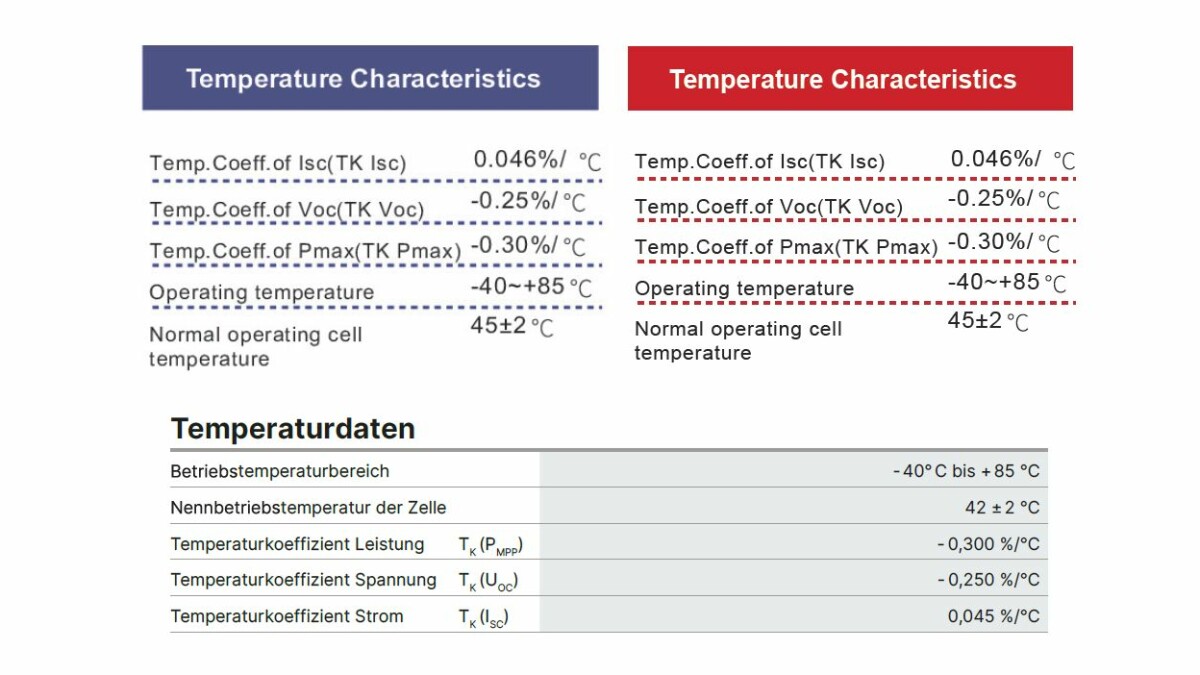
Temperature data from various solar modules
Update capability from 600 to 800 watts
Newer generation balcony power plants have an inverter as standard, the maximum feed-in power of which can be increased from the currently prescribed 600 watts to 800 watts – The inverters of the balcony power plants can be updated.
Bifacial and updateable duo balcony power plants
This gallery shows updateable duo balcony power plants with bifacial solar modules from well-known manufacturers.
In order to install such an update, it goes without saying that there is a Bluetooth or WLAN connection, which also enables the system to be controlled and monitored via app. It is true that optimal conditions rarely prevail in winter and the maximum value of 600 watts is rarely actually achieved with a duo system.
NETZWELT may receive a commission from the retailer for links on this page. More info.
As an energy producer, you still want to make full use of the few hours in which this is the case, especially in winter. This will often be the case in summer and will significantly increase the efficiency of the system.
Optional Specs
Newer balcony power plants also no longer come in the classic “solar panel” look, but instead “Full Black Design” therefore – the surface is then kept almost entirely black.
NETZWELT may receive a commission from the retailer for links on this page. More info.
Depending on your aesthetic requirements, you should also pay attention to the appearance and know the alternatives.
Buy balcony power plants for the winter
You can get modern balcony power plants of the latest generation with updateable inverters and bifacial modules from all well-known dealers.
At Solago Buy “winter” balcony power plants from 498 euros*
Advertisement
At Small power station Buy “winter” balcony power plants from 466.65 euros*
Advertisement
At Yuma Buy “winter” balcony power plants from 638 euros*
Advertisement
At private “Winter” balcony power plants from 537 euros*
Advertisement
The alternative to the premium balcony power plant: the bargain
When buying a balcony power plant in winter, you should only choose a model without bifacial modules and update capability if you can buy it at a bargain price – or if you simply don’t have any more money to invest; After all, you have to make an advance payment when purchasing and if you start production in winter, you will hardly see the return at first.
But if you don’t have around 500 euros to start your own energy production with a premium balcony power plant optimized for low light, you don’t have to do without it completely. There are always bargains with 800-watt balcony power plants for under 300 euros free of charge, but sometimes you don’t even recoup the 200 euros you save compared to a premium version over the period of use due to better specs.
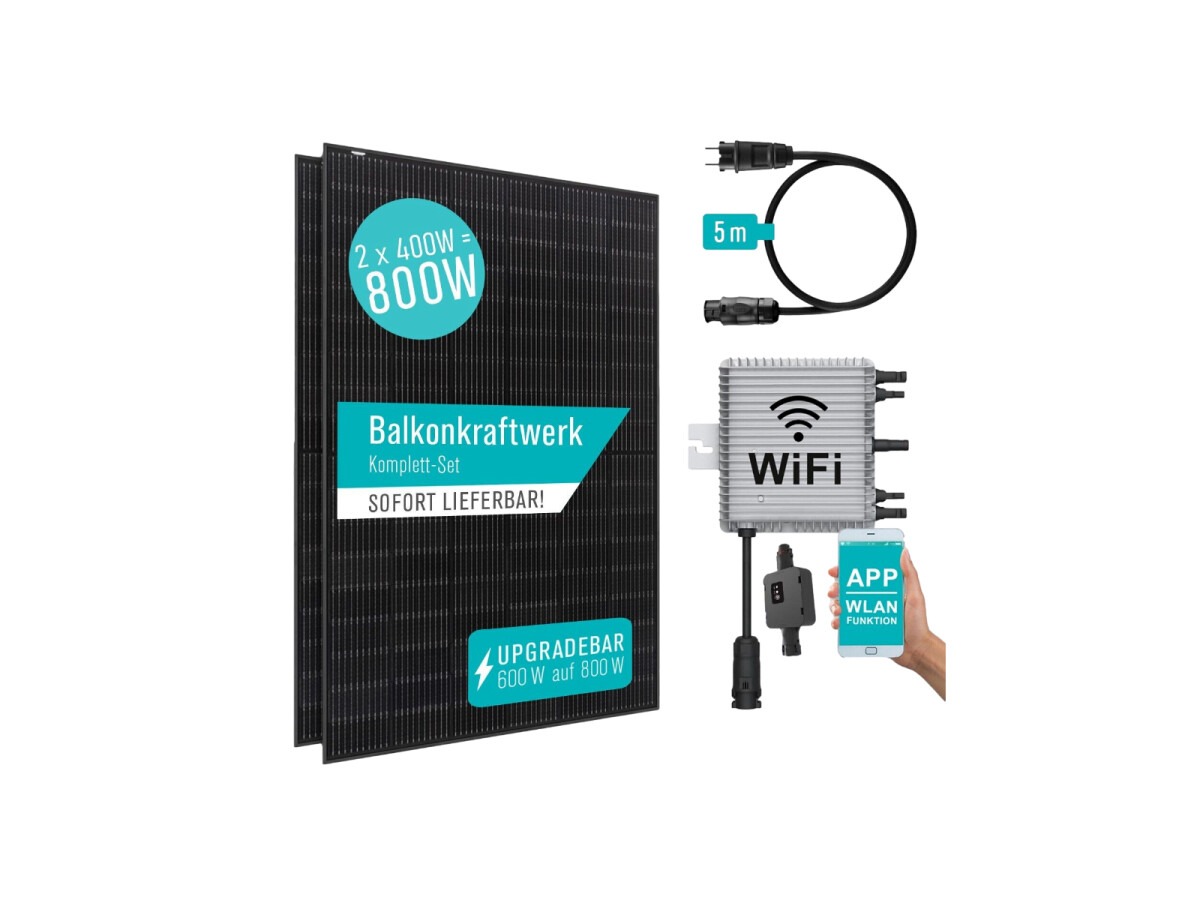
2 x 400W Full Black solar modules
1 x Deye SUN-M80-RED600W inverter (updateable 600/800 watts)
5m connection cable (Schuko)
You can find current deals in our “Bargains” section. In order not to miss a deal, you should also subscribe to our bargain newsletter. Here we regularly provide you with the best offers from the technology sector.
Don’t miss anything with this NETWORK WORLDNewsletter
Every Friday: The most informative and entertaining summary from the world of technology!
